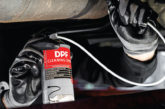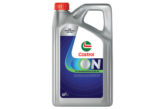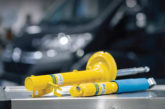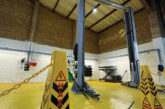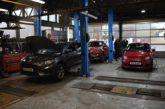In the first instalment of a new series, PMM talks shop with a selection of influential garage owners to get to the heart of the issues affecting the UK’s independent sector. The topic of conversation: customer- supplied parts.
 Dave Hill – London Road Garage
Dave Hill – London Road Garage
Dave has 33 years’ experience in the trade, and has owned and run London Road Garage in Coalville, Leicestershire since 2001, along with his wife Paula.
Shedding the image of the ‘TV soap mechanic’
From the early days of running my business, it was clear in my mind that I wanted to operate the garage on a professional level and as far as possible to create an environment that would attract the right type of customer. I want us (the trade as a whole) to distance ourselves from the ‘TV soap mechanic’ image, which leads many people to believe that anyone at a loose end can turn their hand to car repairs, without a hint of difficulty.
One practice that I noticed early on in my time as a garage owner was that of customers wishing to provide their own parts. Back then I was less concerned (quite ignorant, in fact) of any liability implications associated with such a practice and, although the profit aspect was something that mattered to me, my stance was more focused on what I consider to be the bad manners or plain and simple rudeness on the part of the customer.
“The mark-up that we make on parts represents a considerable percentage of the overall profit that we make, so to give this element of the repair away is not good business practice.”
Customer relations – explaining the issue in layman’s terms
Folks who know me well will have heard many tales about how I have handled challenging customer encounters. For the most part, I am extremely obliging and I try very hard to accommodate the needs of my regular victims (sorry, customers). I do, however, have a very low tolerance for bad manners and I will not allow customers to dictate the pace or process at London Road Garage.
After some thought about how best to put the point across to the customer in the most basic and non- confrontational manner, I considered how cheeky I would feel if I were to take a steak that I had purchased from the supermarket and to present it to the chef at my favourite restaurant. This seemed like an ideal analogy to me, as it struck me as an incredibly disrespectful thing to consider and one that most wise people would grasp quite easily.
I created a sign to place in several prominent places in our reception and waiting area, so that I could simply claim it as company policy and direct the customers’ attention towards the sign. Many customers would see the sign anyway whilst waiting and they will often remark: “I like your sign…very good”. This light- hearted but sincere message has worked extremely well over the years and has been very effective in putting the point across without causing any hostility.
Why say no?
Well, as I said previously, the main motivator for me is manners. Sure we can expect to be challenged by ill-mannered customers in our role as a service provider and we will encounter all sorts of err, how shall I phrase it, ‘interesting’ characters from time to time.
There is a definite trend, in my experience, that customers who are prepared to take the liberty of assuming that it is acceptable to ask the question, will generally turn out to be the type of customer that does not meet the criteria of a customer that I wish to retain.
Don’t join the race to the bottom
A garage is a cash-hungry monster and, although there is money to be made, it certainly isn’t recognised as the most lucrative trade that someone can choose to invest in. The mark-up that we make on parts represents a considerable percentage of the overall profit that we make, so to give this element of the repair away is not good business practice.
If you allow this practice to happen, then, as James Dillon recently phrased it: “You have joined a club that is in a race to the bottom”. Generally, a customer that usually buys his own parts typically does so with the sole intention of saving himself some money. He doesn’t spare a thought to the health of your business or your ability to pay your mechanics at the end of the week. You owe it to your good customers to trade responsibly and charge accordingly.
 Shaun Miller – Millers Garage
Shaun Miller – Millers Garage
Shaun is an IMI diagnostic technician with 15 years’ experience in the automotive industry, and was recently announced as runner up in 2017’s Top Technician competition.
Social networking
Networking is very powerful. While there are many forms of networking these days, I find the simplest method is via Facebook – it’s an amazing tool, it really is. I initially started networking due to my hunger for information and knowledge relating to the automotive industry, and before long I stumbled across a very interesting group about three years ago which appeared to be full of like-minded people.
It was a small group in the grand scheme of things, but I soon realised how clever some of the technicians in the group were, and I ended up spending quite a few hours a day getting to know these guys. At the same time, I had started to notice that more and more customers at work were asking us to fit parts that they had supplied. Through the conversations I’d had online, I realised that I wasn’t alone in this, and a pattern was emerging.
“In fitting customer-supplied parts and not knowing the origin of those parts, how do we know their quality?”
Steve, Dave and I all agreed that the issues where three-fold. Firstly, there is the loss of profit. Parts make up part of the very tight profit margins a modern forward-thinking heavily investing garage should make, allowing customers to supply parts wouldn’t allow us to keep offering the best service we could. Secondly, there’s the safety aspect. In fitting customer- supplied parts and not knowing the origin of those parts, how do we know their quality? They could be the same parts we would fit but how do we know they are not fake? It’s very hard to build a good reputation and very easy to lose it so why risk fitting poor quality parts to save the customer a small amount of money?
Thirdly, and probably most importantly, we later discovered that public liability insurance providers won’t pay out in the event of something happening where the part has been supplied by a customer.
Spreading the word
So, after various conversations with Dave and Steve, I set up the Facebook group ‘Say NO to Customer Supplied Parts’. We are slowly spreading the word to technicians and customers alike. The group currently has around 1160 members but it’s still growing every day.
In my business, I tend to explain the insurance and safety issue to the customer if they ask now, and we have a large poster in reception as well (which is available via the Facebook group). As a result, I have noticed a decline in the amount of customers asking us to fit their parts. All of this was made possible because of networking via Facebook. Amazing, isn’t it?
 Steven Paterson – Krypton Garage & MOT Centre
Steven Paterson – Krypton Garage & MOT Centre
Steve is the head technician in a small three-generation family-run garage, with 30 years of experience under his belt.
Gaining momentum
I have been voicing my opinions on fitting customer-supplied parts and the risks involved for about 10 years now. This has been met with a variety of arguments and has led to many heated discussions. However, until recently, both sides of the argument lacked any real evidence, and it wasn’t until Shaun created the Facebook page that garage owners and technicians really did start to research things in a bit more depth.
People began to share excerpts from their insurance policies which showed exclusions of cover if customer-supplied parts were used, and some garages even reported that their policies also excluded the fitting of used tyres.
It quickly became apparent to many technicians that we need to consider the ‘what if’ scenario. What if customer-supplied brake pads you fitted did fail? From a legal standpoint, the garage has little or no chance of winning their case. Many garages believe that getting customers to sign a disclaimer will be their get out of jail free card, when actually it holds no substance at all. As soon as Joe Public gains an awareness of his rights and this starts filtering down to the various forms of social platforms, then I think a lot of garages and technicians could be in for a few unwelcome shocks.
“Many garages believe that getting customers to sign a disclaimer will be their get out of jail free card, when actually it holds no substance at all.”
From a customer’s point of view, of course, there is nothing wrong with buying your own parts. If a customer plans to fit the part themselves, obviously there is cause for concern with safety- related items but there are many competent DIYers out there capable of doing a job correctly. However, our trade seems to be the only one where the public think it’s ok to supply their own parts – they wouldn’t dream of taking their own drink to a pub and asking the bartender to pour it!
The only way is ethics
But putting the legal and insurance liability implications to one side, shouldn’t we as professionals be obliged for both ethical and moral reasons to simply say that we don’t fit parts supplied by the customer? Although that’s perhaps easier said than done, one thing that was highlighted on the Facebook group was how to explain this issue to the customer without offending them. In my garage, we start off with the infamous steak analogy which I heard about almost 10 years ago from Dave Hill. We then follow this up by explaining the legal implications and some example scenarios that could occur. This is usually enough to, at the very least, make a customer understand the ‘why’.


